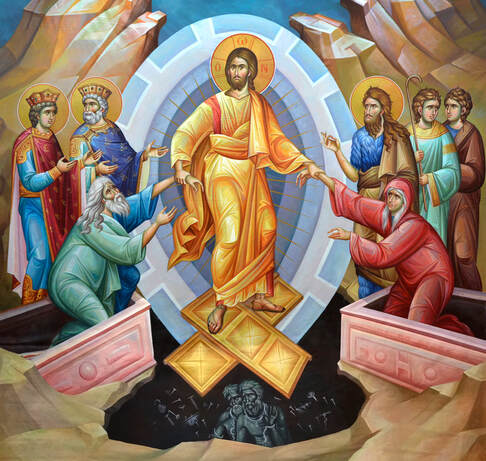This begins the Midnight Service, or Resurrection Service. At the Church of the Holy Sepulcher in Jerusalem (where the tomb of Christ is located), the Greek Orthodox Patriarch of Jerusalem enters the tomb of Christ, without any lighters, matches or flint, only with his candle, and receives the Light directly from Christ. This has been attested to throughout the centuries. Then the priest, accompanied by the altar boys and choir, proceeds down the center aisle to a place in the narthex or outside of the Church. It is at that point where the priest reads the resurrectional gospel reading (Mark 16:1-8). After thepriest is done reading, the Christos Anesti (Christ is Risen) hymn is sung for the first time. After a series of petitions is prayed by the priest and the people, the priest goes back to the altar as the choir sings the remaining hymns of the Resurrection Service.
When the Resurrection Service is completed, the Divine Liturgy of St. John Chrysostom begins. Theme: Christ triumph over death and His Resurrection Resurrectional Gospel: Mark 16:1-8, Liturgy – Epistle: Acts 1:1-8, John 1:1-17 During the Liturgy, the Epistle reading is from the Acts of the Apostles (1:1-8). St. Luke, the author of Acts, describes the general purpose of Christ’s incarnation and the very beginning of the Church as we know it in New Testament times. It recounts the disciples seeing the resurrected Christ and asking Christ if He was going to restore the kingdom to Israel. Christ’s response is interesting. He points to the second coming as the restoration, completely, of the kingdom of Israel. However, that kingdom is for all who accept in faith Jesus Christ as our Lord and Savior as witnessed by the Orthodox Church. The new kingdom of Israel is the Church, which according to St. Luke in this passage, will receive the Holy Spirit to make the Church the living and breathing Body of Christ. The Gospel lesson is from St. John (1:1-17). This, in my humble opinion, is the greatest passage in the Scriptures, and the greatest words ever written. Please look it up and study it. But very briefly, it describes Christ in a cosmic way. St. John connects Genesis 1, the creation, to Jesus’ participation in it. It then goes on to recount St. John the Baptist, the greatest of all the prophets, and how he proclaimed the coming of Christ. Then, it describes how Jesus came not simply to forgive sins and grant eternal life, but something much more than that, St. John tells us that Christ came to make all believers sons of God! This is far more than just forgiving people, this is making us part of God’s family; this makes us participate in God Himself; this makes us able, through faith, to inherit all the blessings and promises that God has made to mankind as we hear in all the Scriptures. Then, St. John tells us that the Word of God, the active agent in creation (Jesus Christ), became flesh and lived amongst us and that He was replete with Grace (the good favor and outpouring of God’s goodness) and Truth. Finally, St. John tells us that the Law was made complete through the incarnation of the Word (Jesus Christ being born as a human being) because Christ brings to the world the Grace (good favor and outpouring of God’s goodness) and Truth. (Juxtapose this understanding with Pilate’s question during Jesus’ mock trial, “And what is truth?” all the while staring Truth in the face…) During this service, it is customary, if not obligatory, to read St. John Chrysostom’s Paschal letter. St. John Chrysostom was born near Antioch in Syria, was ordained there to the priesthood, and later, became Patriarch of Constantinople. He was exiled twice because he was so outspoken against the Empress and her selfish, greedy ways. He was known as the Church’s best orator, ever. This homily is found in our black Holy Week books. It describes how all of us who love Jesus should be celebrating with the utmost of exuberance. Even if our fasting was lacking, now is the time to approach Jesus through the Communion chalice. Finally, he describes, in the most beautiful and upraising of ways, the condemnation of death, and the triumph of the resurrection of Christ and what it means to the world and the individual Christian. Read it: If any man be devout and love God, let him enjoy this fair and radiant triumphal feast. If any man be a wise servant, let him rejoicing enter into the joy of his Lord. If any have labored long in fasting, let him now receive his recompense. If any have wrought from the first hour, let him today receive his just reward. If any have come at the third hour, let him with thankfulness keep the feast. If any have arrived at the sixth hour, let him have no misgivings; because he shall in nowise be deprived thereof. If any have delayed until the ninth hour, let him draw near, fearing nothing. If any have tarried even until the eleventh hour, let him, also, be not alarmed at his tardiness; for the Lord, who is jealous of his honor, will accept the last even as the first; he gives rest unto him who comes at the eleventh hour, even as unto him who has wrought from the first hour. And he shows mercy upon the last, and cares for the first; and to the one he gives, and upon the other he bestows gifts. And he both accepts the deeds, and welcomes the intention, and honors the acts and praises the offering. Wherefore, enter you all into the joy of your Lord; and receive your reward, both the first, and likewise the second. You rich and poor together, hold high festival. You sober and you heedless, honor the day. Rejoice today, both you who have fasted and you who have disregarded the fast. The table is full-laden; feast ye all sumptuously. The calf is fatted; let no one go hungry away. Enjoy ye all the feast of faith: Receive ye all the riches of loving-kindness. let no one bewail his poverty, for the universal kingdom has been revealed. Let no one weep for his iniquities, for pardon has shown forth from the grave. Let no one fear death, for the Savior’s death has set us free. He that was held prisoner of it has annihilated it. By descending into Hades, He made Hades captive. He embittered it when it tasted of His flesh. And Isaiah, foretelling this, did cry: Hell, said he, was embittered, when it encountered Thee in the lower regions. It was embittered, for it was abolished. It was embittered, for it was mocked. It was embittered, for it was slain. It was embittered, for it was overthrown. It was embittered, for it was fettered in chains. It took a body, and met God face to face. It took earth, and encountered Heaven. It took that which was seen and fell upon the unseen. O Death, where is your sting? O Hades, where is your victory? Christ is risen, and you are overthrown. Christ is risen, and the demons are fallen. Christ is risen, and the angels rejoice. Christ is risen, and life reigns. Christ is risen, and not one dead remains in the grave. For Christ, being risen from the dead, is become the first fruits of those who have fallen asleep. To Him be glory and dominion unto ages of ages. Amen. With Love in Christ, +Fr. Nick Comments are closed.
|
AuthorsMessages written by the clergy of our parish. Archives
May 2021
Categories
All
|
© 2023
Saint Nicholas Greek Orthodox Church
3109 Scio Church Road, Ann Arbor, MI 48103
Phone: (734) 332-8200
Fax: (734) 332-8201
Saint Nicholas Greek Orthodox Church
3109 Scio Church Road, Ann Arbor, MI 48103
Phone: (734) 332-8200
Fax: (734) 332-8201


 RSS Feed
RSS Feed
